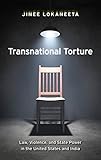Transnational Torture : Law, Violence, and State Power in the United States and India / Jinee Lokaneeta.
Material type: TextPublisher: New York, NY : New York University Press, [2011]Copyright date: ©2011Description: 1 online resourceContent type:
TextPublisher: New York, NY : New York University Press, [2011]Copyright date: ©2011Description: 1 online resourceContent type: - 9780814752791
- 9780814765111
- 345.025
- online - DeGruyter
| Item type | Current library | Call number | URL | Status | Notes | Barcode | |
|---|---|---|---|---|---|---|---|
 eBook
eBook
|
Biblioteca "Angelicum" Pont. Univ. S.Tommaso d'Aquino Nuvola online | online - DeGruyter (Browse shelf(Opens below)) | Online access | Not for loan (Accesso limitato) | Accesso per gli utenti autorizzati / Access for authorized users | (dgr)9780814765111 |
Browsing Biblioteca "Angelicum" Pont. Univ. S.Tommaso d'Aquino shelves, Shelving location: Nuvola online Close shelf browser (Hides shelf browser)

|

|

|

|

|

|

|
||
| online - DeGruyter The Latino Body : Crisis Identities in American Literary and Cultural Memory / | online - DeGruyter Public Religion and Urban Transformation : Faith in the City / | online - DeGruyter Spirituality, Inc. : Religion in the American Workplace / | online - DeGruyter Transnational Torture : Law, Violence, and State Power in the United States and India / | online - DeGruyter T.D. Jakes : America's New Preacher / | online - DeGruyter Not by Faith Alone : Religion, Law, and Adolescence / | online - DeGruyter The Atheist : Madalyn Murray O'Hair / |
restricted access online access with authorization star
http://purl.org/coar/access_right/c_16ec
Evidence of torture at Abu Ghraib prison in Iraq and harsh interrogation techniques at Guantánamo Bay beg the question: has the "war on terror" forced liberal democracies to rethink their policies and laws against torture? Transnational Torture focuses on the legal and political discourses on torture in India and the United States-two common-law based constitutional democracies-to theorize the relationship between law, violence, and state power in liberal democracies.Analyzing about one hundred landmark Supreme Court cases on torture in India and the United States, memos and popular imagery of torture, Jinee Lokaneeta compellingly demonstrates that even before recent debates on the use of torture in the war on terror, the laws of interrogation were much more ambivalent about the infliction of excess pain and suffering than most political and legal theorists have acknowledged. Rather than viewing the recent policies on interrogation as anomalous or exceptional, Lokaneeta effectively argues that efforts to accommodate excess violence-a constantly negotiated process-are long standing features of routine interrogations in both the United States and India, concluding that the infliction of excess violence is more central to democratic governance than is acknowledged in western jurisprudence.
Mode of access: Internet via World Wide Web.
In English.
Description based on online resource; title from PDF title page (publisher's Web site, viewed 01. Nov 2023)


